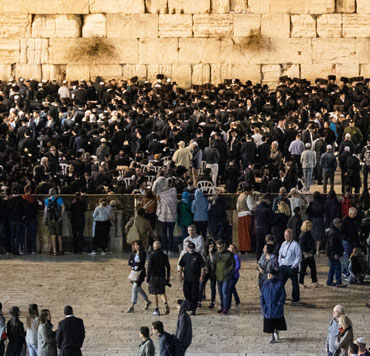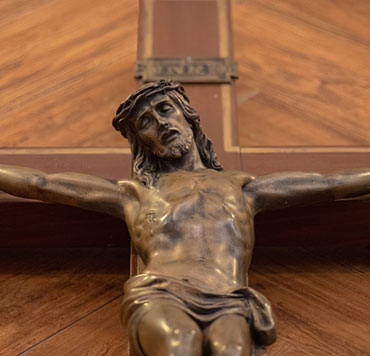
By EveryStudent.com
Since many people associate Jesus with Christians, let's be clear. People who call themselves “Christians” don’t necessarily hold the political views that Jesus would endorse.
For example, the Nazis called themselves Christian. So did the Ku Klux Klan. And prior to the Civil War in the U.S. in the 1860s, many Christians were using the Bible (incorrectly) to justify enslaving people.
Did Jesus Christ ever model violence or hatred toward others? Just the opposite.
In fact, Jesus gave this one decisive test of a person who truly represents him: “By this all people will know that you are my disciples, if you have love for one another.”1
Jesus taught people to have compassion and care for others. Rather than taking revenge, love your enemies, including political enemies.
 Jesus, who was Jewish, grew up near Jerusalem, a little more than 2,000 years ago. At the time, Israel was under the rule of the harsh Roman government.
Jesus, who was Jewish, grew up near Jerusalem, a little more than 2,000 years ago. At the time, Israel was under the rule of the harsh Roman government.
The Romans leveled brutal taxes on the people and they demanded near worship of Caesar. So there were occasional attempts to overthrow the government. But these were quickly extinguished.
Regarding the hated tax collectors, Jesus often welcomed them to dinner. It wasn’t for strategic gain. Jesus also wanted them to know his love for them.
Jesus covered many topics in his public teaching: forgiveness, prayer, marriage, helping the poor, revenge, etc. Yet, despite the oppressive nature of the Roman government, it seemed to Jesus as a nonissue. Politics apparently was of little interest to Jesus.
However, there was a powerful group of people, connected to the government, that Jesus publicly challenged often—the Jewish religious leaders.
The Pharisees, Sadducees and scribes prospered very well under Roman rule. These religious leaders cooperated with the Roman government, gaining their own power, prestige, and wealth.
As if the Roman tax wasn’t oppressive enough, the Pharisees and Sadducees added a temple tax. They also made a lucrative business selling animals they required for sacrificial rituals. And they enforced strict religious laws over women, the disabled and non-Jewish groups of people.
On one hand, Jesus said little politically. Yet Jesus did not hold back in his accusations about the religious leaders and the power they wielded … authority given to them by the Roman government.
In Jesus’ eyes, these religious leaders were supposed to be shepherding, caring for the people of Israel. Instead these spiritual leaders were merely inflicting harsh requirements on people who were already hurting.
Jesus said of them, in public, and forcefully:
“They bind heavy burdens, hard to bear, and lay them on men’s shoulders; but they themselves will not move them with their finger.”2
“Woe to you, scribes and Pharisees, hypocrites! For you clean the outside of the cup and the plate, but inside they are full of greed and self-indulgence.”3
“Woe to you, scribes and Pharisees, hypocrites! For you … have neglected the weightier matters of the law: justice and mercy and faithfulness.”4
Often when Jesus mentioned “justice” he was not referring to punishment. He spoke of justice in terms of meeting people’s needs, of acting justly toward those without food, clothing, shelter.
The prophet Micah wrote: “He has told you, O man, what is good; and what does the LORD require of you but to do justice, and to love kindness, and to walk humbly with your God.”5
 Jesus painted this picture of actions that are just:
Jesus painted this picture of actions that are just:
“I was hungry, and you fed me. I was thirsty, and you gave me drink. I was a stranger, and you invited me into your home. I was naked, and you gave me clothing. I was sick, and you cared for me. I was in prison, and you visited me.”6
This was the opposite of how the Pharisees treated the poor, the sick, the destitute. The Pharisees would cross to the other side of the street, rather than be accidentally touched by someone they deemed “unclean.”
Jesus’ first confrontation came in the Temple. The sacred manuscript written by the prophet Isaiah was handed to Jesus to read. Jesus chose chapter 61, a section about the coming Messiah. Jesus read aloud:
“The Spirit of the Lord is upon me, because he has anointed me to proclaim good news to the poor. He has sent me to proclaim liberty to the captives and recovering of sight to the blind, to set at liberty those who are oppressed…”7
After reading this, Jesus announced that this prophecy is now fulfilled. Jesus was stating that he personally was the coming Messiah that Isaiah wrote about 700 years earlier.
Of course this caused an uproar. That’s an enormously bold statement to make. Further, Jesus was not acting like the Messiah they expected.
The Jews were looking forward to a Messiah who would be a political leader, who would overthrow the Roman government and set in place Jewish rule over Israel for all eternity.
Quite the opposite of seeking governmental power, Jesus spent leisurely dinners with prostitutes, thieves, the poor, sick and marginalized. He did so out of love for them and to care for them.
The four biographies of Jesus in the Bible are filled with encounters of Jesus healing individuals. from blindness, paralysis, leprosy and diseases, even bringing dead people back to life.
Thousands of people would gather to hear Jesus teach and to heal them. Up until then, the Pharisees and Sadducees held their attention. Now people were drawn to Jesus. The Pharisees started to grow increasingly jealous, fearing that they might lose their positions of power.
They needed to get rid of Jesus.
First they tried trapping Jesus in his words, hoping he would be arrested by the Roman government.
On one occasion, the Pharisees chose a hot topic… taxes. The Pharisees asked Jesus:
“Teacher,” they said, “we know how honest you are. You are impartial and don’t play favorites. You teach the way of God truthfully. Now tell us—is it right to pay taxes to Caesar or not? Should we pay them, or shouldn’t we?”
Jesus saw through their hypocrisy and said, “Why are you trying to trap me? Show me a Roman coin, and I’ll tell you.” When they handed it to him, he asked, “Whose picture and title are stamped on it?”
“Caesar’s,” they replied.
“Well, then,” Jesus said, “give to Caesar what belongs to Caesar, and give to God what belongs to God.”8
Less interested in the Roman Kingdom, Jesus talked about the kingdom of God, sometimes referring to it as the kingdom of heaven.
The Pharisees asked Jesus when the kingdom of God was coming. They wanted to know when the Messiah would appear.
Jesus answered them, “‘The kingdom of God is not coming with signs to be observed … for behold, the kingdom of God is in the midst of you.”9
In other words, Jesus was saying, “The kingdom of God is right here. I’m the Messiah you’re waiting for.”
Jesus often pointed to himself, to his identity as equal to God. Jesus made statements such as, “I am the light of the world. He who follows me will not walk in darkness, but will have the light of life.”10
And, “For as the Father raises the dead and gives them life, so also the Son [Jesus] gives life to whom he will. For the Father judges no one, but has given all judgment to the Son, that all may honor the Son, just as they honor the Father.”11
 Over the course of three years, Jesus’ following grew.
Over the course of three years, Jesus’ following grew.
“Jesus traveled throughout the region of Galilee, teaching in the synagogues and announcing the Good News about the Kingdom. And he healed every kind of disease and illness. News about him spread as far as Syria, and people soon began bringing to him all who were sick. And whatever their sickness or disease, or if they were demon possessed or epileptic or paralyzed—he healed them all. Large crowds followed him wherever he went…”12
After Jesus raised Lazarus from the dead and so many Jews believed in Jesus, the religious leaders decided it had reached a breaking point.
“…the chief priests and the Pharisees gathered the council, and said, ‘What are we to do? For this man performs many signs. If we let him go on thus, everyone will believe in him, and the Romans will come and destroy both our holy place and our nation.’ …So from that day on they took counsel how to put him to death.”13
As much as they wanted to, the Pharisees couldn’t actually put Jesus to death. It was against their Jewish laws. But they knew the Romans could.
Their opportunity came when Judas, one of Jesus’ closest followers, betrayed Jesus. He offered to lead the Jewish authorities to Jesus in the middle of the night, for a fee of 30 pieces of silver.
“Judas, procuring a band of soldiers and some officers from the chief priests and the Pharisees, went there with lanterns and torches and weapons.”14 And they arrested Jesus.
First came a religious trial.
The Jewish high priest asked Jesus if he was the Messiah. “‘Are you the Christ, the Son of the Blessed?’ And Jesus said, ‘I am; and you will see the Son of man seated at the right hand of Power…’”15 They charged Jesus with blasphemy, equating himself with God.
Then they brought Jesus to Pilate, the governor of the Roman province of Judea.
Interrogating Jesus, Pilate was having difficulty finding any government laws that Jesus had broken and wanted to free Jesus.
The Jews told the governor, “We have a law, and according to that law he ought to die because he has made himself the Son of God.”16
Pilate wanted to appease these religious rulers. Pilate tried this political route. Since Caesar could have no one else threatening his rule, laying claim to any other kingship, Pilate asked Jesus, “Are you the King of the Jews?”
Jesus answered, “My kingship is not of this world; if my kingship were of this world, my servants would fight, that I might not be handed over to the Jews; but my kingship is not from the world.”17
At that point Pilate tried to free Jesus, but by then the Jewish authorities had created a mob revolt and they all called for Jesus to be crucified.
This was not surprising to Jesus. He often spoke about what would eventually happen to him.
“…we are going up to Jerusalem, and everything that is written about the Son of Man by the prophets will be accomplished. For he will be delivered over to the Gentiles [Romans] and will be mocked and shamefully treated and spit upon. And after flogging him, they will kill him, and on the third day he will rise.”18
 Jesus was whipped with a cat-o-nine-tails, a crown of thorns pressed into his head, then beaten, then his wrists and feet were nailed to a cross of wood, then this cross was set upright for a torturous death. On either side of him were two criminals, also on crosses.
Jesus was whipped with a cat-o-nine-tails, a crown of thorns pressed into his head, then beaten, then his wrists and feet were nailed to a cross of wood, then this cross was set upright for a torturous death. On either side of him were two criminals, also on crosses.
One of the criminals said to Jesus, “‘Jesus, remember me when you come into your kingdom.’ And he said to him, ‘Truly, I say to you, today you will be with me in paradise.’”19
Perhaps this man had been among the crowds when Jesus had said, “I give them eternal life, and they shall never perish, and no one will snatch them out of my hand.”20
And, “…whoever hears my word and believes him who sent me has eternal life. He does not come into judgment, but has passed from death to life.”21
Jesus offered this one proof that he truly is God as he claimed to be: he would come back to life three days after being buried.
The Jewish leaders knew about Jesus’ claim to come back to life, so they asked Pilate for an entire guard of Roman soldiers to be placed at the opening of Jesus’ tomb, which Pilate granted.
Yet, on the third day, there was a great earthquake. The massive stone closing the tomb was moved away with an angel sitting on it. “His appearance was like lightning, and his clothing white as snow. And for fear of him the guards trembled” and fled.22
“…some of the guard went into the city and told the chief priests [religious leaders] all that had taken place.”
“And when they [the religious leaders] had assembled with the elders and taken counsel, they gave a sufficient sum of money to the soldiers and said, ‘Tell people, ‘His disciples came by night and stole him away while we were asleep.’”
“And if this comes to the governor's ears, we [the religious leaders] will satisfy him and keep you out of trouble.” So they took the money and did as they were directed.”23
This is how close the partnership was between the Jewish religious authorities and the Roman government. The religious leaders assumed they could convince the Roman government not to punish the soldiers who left their post, which normally would mean their execution.
That would have been the end, and today no one would be believing in Jesus … except for one factor.
 Jesus did rise from the dead and physically showed up among many people over the next 40 days, eating with them, talking with them, and continuing to teach them.
Jesus did rise from the dead and physically showed up among many people over the next 40 days, eating with them, talking with them, and continuing to teach them.
As a result, faith in Jesus spread throughout Israel, Syria, Turkey and the Roman Empire.
Jesus’ kingdom is far more important than any political, earthly kingdom or government.
Jesus invites us to come to him and enter his kingdom, so that we might have a more abundant life now having started a relationship with him, a personal relationship that continues into eternal life. Jesus said, “…whoever comes to me I will never cast out.”24
If you would like to invite Jesus to come into your life, you can right now. The following might help you put it into words that you can say to him:
“Jesus, thank you for dying on the cross for my sins, so there need not be any barrier between us. I ask you to forgive me and come into my life, and lead me, guide my life. Thank you for giving me a personal relationship with you. Amen.”
| ► | I just asked Jesus into my life (some helpful information follows)... |
| ► | I may want to ask Jesus into my life, please explain this more fully... |
| ► | I have a question or comment... |
Footnotes: (1) John 13:35 (2) Matthew 23:4 (3) Matthew 23:25 (4) Matthew 23:23 (5) Micah 6:8 (6) Matthew 25:35,36 (7) Luke 4:18 (citing Isaiah 61:1,2) (8) Mark 12:14-17 (9) Luke 17:20,21 (10) John 8:12 (11) John 5:21-23 (12) Matthew 4:23-25 (13) John 11:47, 48, 53 (14) John 18:3 (15) Mark 14:62 (16) John 19:7 (17) John 18:36 (18) Luke 18:31-33 (19) Luke 23:42,43 (20) John 10:28 (21) John 5:24 (22) Matthew 28:2-4 (23) Matthew 28:11-15 (24) John 6:37
Other articles/videos you might be interested in…